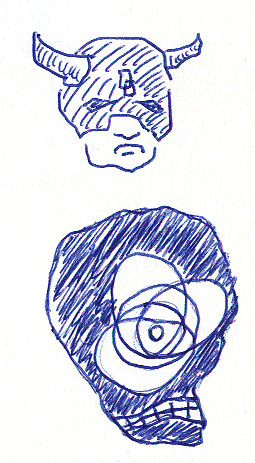Comic Book Philosophy Part 2
In a recent interview I was asked why I wanted to work in the public defense system. How could I dovetail my concept of social justice with a job description that included digging up loopholes and lame defenses for pimps, crooks and wifebeaters? This is a massively difficult question. This is an interview-making or breaking question. It's a question I stumbled on mightily because I found it impossible to give my real answer. I couldn't do it because I couldn't bring myself to talk about Daredevil in a job interview.
Instead of giving my real answer I mumbled a bit about creating a boundary between your work and your life and not investing all of your social work self-image into your job. I maintained that I'd be okay with the work load because I also volunteer, fundraise for international non-profits, and try to be a caring person in a whole range of domains. Really, it wasn't a terrible answer... but my eyes would have lit up and I would have spoken with passion and truth if I had been willing to talk about Matthew Murdock.
I grew up reading comic books. And like many of my generation, fed my moral development a steady diet of X-Men, Spider-Man, The Punisher, Captain America, Iron Man and The Avengers. I didn't always agree with the protagonist's position, but Marvel had a penchant for injecting their stories with sophomoric moral quandaries that stimulated the adolescent mind. The most fascinating of which to me was ol' hornhead... a blind defense attorney named Matthew by day, and a costumed vigilante known as Daredevil, the Man Without Fear by night.

A bad sketch I once did of Daredevil and his arch nemesis Bullseye
Why such a fascination?
Daredevil always had morally complex relationships with his villains. One of his villains, a buffalo-sized man named Melvin Potter (who was also known as The Gladiator) was also shown as a gentle man who was a victim of his own mental illness. And while DD might beat him up on page four, he'd be defending him in court by page 15. One of DD's main villains, The Kingpin, was often shown in a sympathetic light... especially when the book described how brutal and chaotic organized crime would look without a strong central boss. Stoolies and low-level thugs (like the recurring character Turk Barrett) were shown as pathetic victims of their environment... people who just never really had enough smarts to think themselves off the streets. And of course, there was Bullseye, the centerpiece villain of the Daredevil series. Bullseye upped the ante. He wasn't a villain that blustered and threatened and had their plans foiled at the last minute. He actually killed people. He killed main characters. He raised the stakes of the moral conundrums. How could Daredevil see the humanity in a cold-blooded killer? Could he save the life of a scumbag like that?
In posing and answering these questions, Daredevil gave me an interesting definition of heroism. I developed a sense that heroism wasn't always about jumping into the way of danger, it wasn't just using your powers to defend the little guy from a bully. Daredevil posited a kind of heroism that challenged us to do the hardest things... to think deeper and show compassion in the face of your enemy. It suggested that heroism could also be protecting the worst of us from our own desire to punish and purge such villainy from society.
I think one of the most noble things about western civilization is the commitment to public defense. It is surely imperfect, and there are not enough genuine attempts within the penal system to actually help people get better. But to look into the faces of some of the most vile flaunters of the social contract and think, "This is still a person" is what protects us from the devolution of mob rule and the court of public opinion. I believe in it. And it's too bad that interview didn't go better, because I would have done a damn fine job... even when it made my stomach turn, because of the example Daredevil laid out for me.
Labels: Philosophy

3 Comments:
I wonder why you found it hard to give this answer in an interview... you're right, the passion would have been felt.
Good luck anyway!
Nerd. Go back to your D&D.
Thanks Jimmimoose, for answering Walaka's question for me. ;)
Post a Comment
<< Home